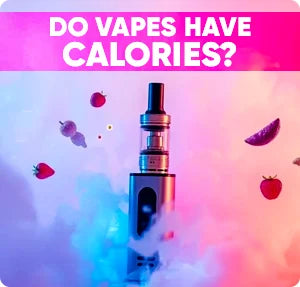Do Vapes Have Calories?


Vaping has taken over as a go-to alternative to smoking, but there’s still plenty of curiosity - and confusion - around it. One question that pops up? Do vapes have calories? And if they do, does vaping make you gain weight?
Some vapers worry that sweet, dessert-flavoured e-liquids might sneak in extra energy. Others wonder if vaping, like smoking, could have any impact on metabolism or appetite. It’s a fair question - especially when we’re all a little more conscious these days about what goes into our bodies.
So, does vaping have calories? Yes, but not in a way that matters.
Calories In a Vape
Vaping fluids, more commonly known as e-liquids, contain calories but don’t work like food energy. The two main ingredients in most vape juices - Vegetable Glycerin (VG) and Propylene Glycol (PG) - both have caloric value.
- VG (Vegetable Glycerin) – A naturally sweet liquid derived from vegetable oils, VG has about 4.3 cal. per gram. It’s widely used in food, cosmetics, and pharmaceuticals, making it a common (and safe) ingredient.
- PG (Propylene Glycol) – A synthetic liquid that helps create vapour, PG has roughly 4 cal. per gram and is found in many processed foods, including ice creams, soft drinks, and flavourings.
The calories, however few, are there. But you’re not digesting these when you vape. Unlike food, which your body processes for energy, e-liquid is vaporised and inhaled - not swallowed. That means it doesn’t contribute to weight gain or impact your daily intake in any meaningful way.
We'd have a very different conversation if vapes worked like food or drink. But since the vapour isn’t metabolized in the same way, the impact of these calories is virtually zero.
How Many Calories In a Vape?
A discussion about calorie content in e-liquids is well and good, but for better understanding, let’s put some numbers (in terms of calorie count) to it:
- Per Milliliter: Around 4-5
- Per 10ml Bottle: Roughly 40-50
- Per 50ml Shortfill: Around 200-250
- Per Day (for a typical vaper using 2-5ml): About 8-25, which don’t count toward your diet
Now, to put that in perspective, you burn about 50 calories just by being awake for an hour. So even if you vaped an entire bottle of e-liquid (which isn’t happening in one sitting - and no, that’s not a challenge!), you’d still burn off any theoretical intake simply by existing.
Do Flavoured Vapes Have Calories?
And what about flavoured disposable vapes? Those creamy custard, caramel, or fruity blends? The good news is that they don’t add extra calories. The flavourings used in vape juices are highly concentrated and contribute negligible value.
Some brands might use tiny amounts of sweeteners but not sugar. And even if sugar were used (depending on the manufacturer), it wouldn’t be metabolised the same way since you’re not consuming it—you’re inhaling it.
Does Nicotine Affect Weight?
If you’ve heard that nicotine impacts weight, you’re not wrong. It does - but not in a way that makes vaping a weight-loss hack.
Nicotine affects the body in two key ways when it comes to weight:
- It suppresses your appetite. Nicotine interacts with the central nervous system and can make you feel less hungry. It also affects the brain’s reward system, reducing cravings for food in some people.
- It slightly increases metabolism. Studies suggest nicotine can raise resting energy use by 7-15%, which means your body might burn a few more calories than it normally would.
This is partly why some ex-smokers gain weight when they quit. Without nicotine suppressing their appetite, they eat more. But it’s important to note:
-
The metabolic effect isn’t drastic. It won’t make a major difference in the long run.
-
Nicotine is not a weight-loss tool. Relying on it for appetite suppression is risky, given its addictive properties.
So, while nicotine might play a small role in appetite and metabolism, it’s not significant enough to warrant using it for weight control.
Can Vaping Make You Gain Weight?
Not directly. The act of vaping itself doesn’t pack on pounds, but some vapers notice changes in eating habits. Here’s why:
-
Ex-smokers May Snack More. If you’ve quit smoking and switched to vaping, you might find yourself replacing old routines (smoking after meals, cigarette breaks) with food instead.
-
Sweet Flavours Can Trigger Cravings. Some people report that dessert-flavoured vapes make them crave actual desserts.
- Nicotine Withdrawal Can Affect Appetite. If you lower your nicotine intake or quit vaping, your body might compensate by increasing hunger.
That said, vaping doesn’t contain enough calories to cause weight gain, nor does it interfere with weight loss efforts. If you’ve put on a few pounds after switching to vaping, it’s likely due to lifestyle changes rather than the vape itself.
How Many Calories In a Cigarette?
Yes, cigarettes contain calories, too - but just like with vaping, they don’t contribute to your diet in any meaningful way.
- A single cigarette has about 5-10 calories (mainly from sugars and additives used in the tobacco).
- Since you’re burning and inhaling, you’re not digesting these calories.
So, whether you’re vaping or smoking, energy intake isn’t the issue - health effects are.
Final Thoughts
Here are the key takeaways:
- Vapes contain calories, but you’re not consuming them in a way that affects weight.
- Nicotine can influence appetite and metabolism, but it’s not a safe weight management tool.
- Weight changes after switching to vaping are more about behaviour than vaping itself.
If you’re worried about the calories in vape juice, don’t be. The numbers are tiny, and they don’t work like food calories. You’re far more likely to gain weight from vaping-related habits (like increased snacking) than from the e-liquid itself.
So, vape guilt-free - at least when it comes to nutritional content. The real conversation should be about your overall health, not your waistline.
